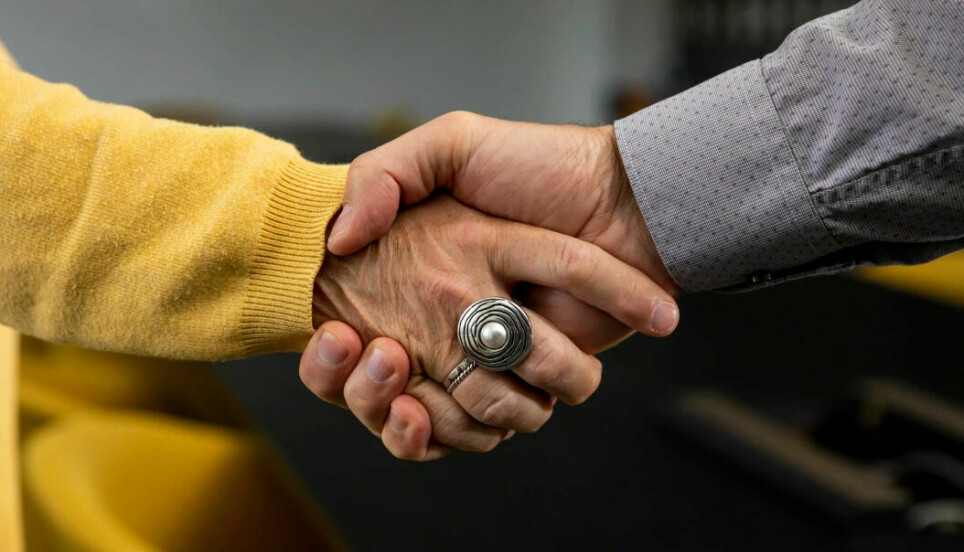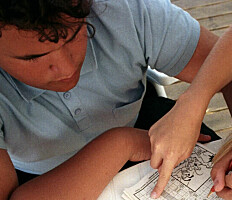
This is why we forget names
And this is what you can do to remember them.
Their name is often the first piece of information we get about a new person we meet. It's also the first thing we forget.
This can lead to embarrassing situations when we meet people whose names we cannot remember. We make small talk whilst we race through the archives in our brains.
New studies about the memorisation of names are constantly coming out. Such as a study from earlier this year that showed that deep sleep can help you remember names. Or the study which shows that it is most difficult to remember common names – but also rare names. Or the study where the participants received electricity to their brains to remember better.
Regardless of the method, researchers agree that it is not surprising that we forget.
Because names are quite random. They don't give any indications about us as people.
Associations
If all those named Sarah were very thin, and everyone named Bob was shaped like a bear, then we wouldn't have such big problems.
But the name Astrid says nothing about the person Astrid.
If you learn that Astrid is a plumber from Bergen, you get many more associations. Therefore, it is easier for us to remember what people do or where they live rather than their name, according to research in the field.
It's also easy to mix up names.
You may know several Astrids. And was the girl you just met named Mary, Maria, Marie or Margarate? Your new neighbour, Hans, reminds you of your friend Henry. According to a study, the chances are high that you will remember Hans as Henry in such cases.
We are not interested enough
A simple explanation for not remembering names is that we don't care.
You might not be that interested in the person you're greeting or think you'll never meet them again.
The problem only arises if you in fact do meet again.
You don't forget the names of people who matter to you, like the incredibly handsome guy you meet at a party or the name of your new boss.
If you are motivated to remember names, there is a higher chance that you will. Many have professions where remembering names and faces is important.
Hanne Solem is one of them.
Motivated to learn names
Solem is a recently retired teacher from Oslo. For over 40 years, she quickly learned the names of the children in her class, in addition to the names of their parents.
“I also learned the names of the children in the other three classes in the same year group,” she says.
As a teacher, she had to build a relationship with each student.
“I have to see each individual student, they have to trust me, know that I care and be motivated to learn. Therefore, I had to know the students' names,” Solem says.
She learned all the names in the first week of school.
“It was absolutely necessary,” Solem tells sciencenorway.no.
In order to remember, you have to invest time and concentration.
Be less concerned about yourself
Concentration can be a big problem. When we meet new people, we are often preoccupied with ourselves. How does my hair look? What shall I say?
Geir Selbæk believes that forgetting names is related to the situation where you hear the name for the first time. He is a professor and head of research at the Norwegian National Centre for Ageing and Health.
“If you don’t enter the names in a proper way, it's more difficult to remember them afterwards. Perhaps you're at a party and mostly concerned with how you look. Then you won’t concentrate on the names of those you meet,” Selbæk tells sciencenorway.no. “It has an impact on how the names are stored.”

The more, the better
One theory as to why older people are worse at remembering names is that their archive has become too large.
A 60-year-old has met and stored many more people in their memory than a 25-year-old has. It therefore takes longer to find the right name. But Selbæk does not believe in this theory.
“I don't think that's right. Because memory doesn't work like that for other things. Instead, the more you put into your memory, the more you remember,” he says.
If you have been good at learning names, numbers or places, it can help you when you get older. A large archive in the brain helps, according to Selbæk.
“It's called cognitive reserve, and it can delay the development of Alzheimer's,” he says.
It’s all about age
Some, both young and old, claim they are particularly hopeless with names. But the professor does not believe that personality plays a deciding factor.
“Forgetting names increases as you get older. If it was decided by your personality, it would remain stable throughout life,” Selbæk asserts. “Not remembering names is down to age.”
But you can also be affected by memory loss earlier in life.
“Parents of young children are exposed to cognitive impairment. They have so much else to remember and concentrate on that their memory fails on things other than children and chores,” Selbæk says. “But this is of course temporary.”
Normal deterioration of how the brain works gradually begins between the ages of 25 and 30. From there it goes steadily downhill. At the age of 60, the deterioration accelerates, and from the age of 80 it is even faster.
“But it's important to remember that there are large individual differences,” Selbæk says.
Hanne Solem does not think it became more difficult to learn and remember the names as she got older. She was still motivated by the relationship and her interest.

60-year-olds make fewer mistakes
And Solem hasn't forgotten the names of her old students.
“I was a teacher in northern Norway in the mid-1970s. I still remember the names of the students from that time,” she says.
Older people generally take longer to retrieve names from memory, but the good news is that some things still improve.
“We get a larger vocabulary and a better ability to analyse and put information together,” says Selbæk. “Even if a 60-year-old takes longer, he takes fewer chances. Therefore he also makes mistakes less often than a 25-year-old, who takes bigger chances and therefore makes mistakes more often.”
Say it again, and again
Researchers are also working to find methods to remember names.
One method is repetition.
You are at a party and meet a person you've never met before. You say hello, and she says her name is Emma. Then repeat the name: "Hello, Emma." You move on, but after a few minutes you repeat the name: You met Emma. Feel free to say it out loud. And before you leave for the evening, you say it again: You met Emma.
By doing this, you should be able to remember the name until the next time you meet Emma, according to those who swear by this method.
Teacher Hanne Solem used this method.
“I said the names often. That was good, Tom. Hello, Tom. Have at it, Tom. It builds the relationship with the student, but also helps you remember the name,” she says.
We forget neutral people
Several researchers have investigated whether descriptions help people remember.
Participants in several studies have been presented with pictures, names, and a description of the person.
A new American study found that negative or positive descriptions made it easier to remember names. But if the face in the picture had a neutral expression and the description was neutral, it was not helpful for remembering.
Another study from 2021 tested how good witnesses people were if they overheard a conversation. The participants were given a description of a crime and the names of who had done what. The result showed that that they remembered what the criminals had done, but not what their names were.
King Harald and moon-faced Mona
Another method is the association method, where you create your own descriptions.
You meet Mona. Mona has a moon face. You will remember Mona's moon face.
You meet Harald. He looks a bit like King Harald. You will remember King Harald.
The trick is to make a connection to the name and not focus on remembering the name alone.
The best is a combination of methods: Repeat the name and create an association.

May be a sign of impairment
All the research on memorising names, especially in psychology and neurology, has its explanation.
“Forgetting people's names is part of normal ageing. Researchers are concerned about the signs of normal deterioration of memory,” Geir Selbæk says.
Not remembering names of people and things can also be a symptom of early-onset Alzheimer's. Many researchers are interested in this.
A bit of self-interest in this particular research area is also a possible explanation.
“Researchers notice it themselves, that we forget names. It can stimulate interest in such studies,” Selbæk says.
———
Translated by Alette Bjordal Gjellesvik.
Read the Norwegian version of this article on forskning.no
References:
Abrams et al. Competitors or Teammates: How Proper Names Influence Each Other, Current Directions in Psychological Science, vol. 26, 2017. DOI: 10.1177/0963721416677804 Abstract.
Burton et al. I recognise your name but I can’t remember your face: An advantage for names in recognition memory, Quarterly Journal of Experimental Psychology, vol. 72, 2018. DOI: 10.1177/1747021818813081 Abstract.
Swanson et al. Incidental learning of proper names and “earwitness” recall, Memory, 2021. DOI: 10.1080/09658211.2021.1925301 Abstract.
Whitmore et al. Targeted memory reactivation of face-name learning depends on ample and undisturbed slow-wave sleep, npj Science of Learning, 2022.



































